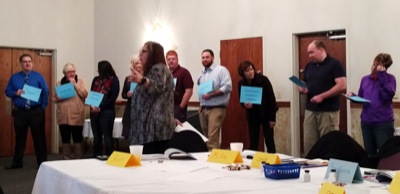Tuesday, November 22nd, 2016
Expert cites critical need for mental health first aid
By Jared Mauch

Photo by Jared Mauch/The Daily Standard
Participants work to correctly list mental illness disabilities during a mental health first aid class on Monday at Romer's Catering in Celina.
CELINA - County, church and other local officials are on the front line in dealing with mental health issues, an expert said Monday.
Partnership for Violence Free Families Executive Director Donna Dickman spoke at Romer's Catering to those first responders about mental first aid and ways to help people with mental illness, which can lead to a variety of disabilities.
"It limits your life. It limits your relationships. It limits your work or school environments," she said.
Disabilities can range from gingivitis and back pain to post traumatic stress disorder and dementia. Depression can hinder a person's ability even to get out of bed.
Mental health first aid is vital because of the prevalence of mental health crises, she said. First responders must understand the signs of mental illness because some people in need try to hide their illnesses and their issues may not be obvious, she said.
Mental health first aid is "offered to a person developing a mental health problem or experiencing a mental health crisis," said Dickman of Lima. "The first aid is given until the appropriate treatment and support are received and the crisis is resolved."
First responders providing comfort and treatment to someone with a mental illness is the equivalent to giving CPR to someone not breathing, she said.
"We can comfort somebody or calm them down," Dickman said.
People in need don't immediately require counseling or therapy. They need someone to be there until professionals can take over, she added.
Mental health first aid comes into play when someone experiences an issue such as a panic attack or post traumatic stress attack, Dickman said.
Professionals have adapted a first-response plan created in Australia, she noted. The first step is to assess the risk of suicide or harm. Responders should listen non-judgmentally to those in need and then reassure them they'll receive help.
"People won't go get help if they think they're going to be judged. And we do, we do judge," Dickman said.
Finally, responders should encourage those in need to seek appropriate professional help, self-help and support strategies, she said.
The stigma of mental illness can be alleviated by proven treatment, she added.
"If we have folks who need help, we need to know where those resources are and get them help," she said.
About one in five people in America have some sort of mental illness, and many are afraid to seek help, she said.
Mental health first aid, depression and anxiety were covered in the morning portion of the eight-hour class. Also scheduled for the day were sessions on substance-use disorder, suicide, panic attacks and traumatic events.
Depression and anxiety are the two most common mental illnesses in America, but both are treatable through medication, counseling and therapy, she said.
Cookie-cutter approaches may not work, but treatment options exist, Dickman said.
